Books
Books
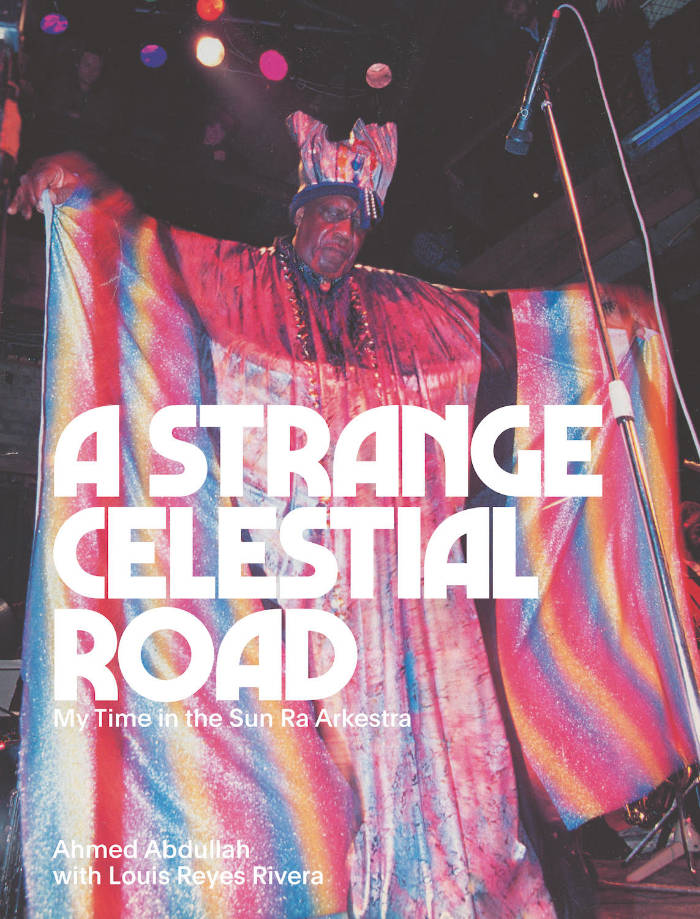
A Strange Celestial Road – My Time in the Sun Ra Arkestra
Louis Reyes Rivera, Ahmed Abdullah
In this memoir, Harlem-born trumpeter Ahmed Abdullah recounts decades of national and international touring with the Sun Ra Arkestra and charts the rise of New York loft jazz scene, offering a fascinating portrait of advanced music in Brooklyn and lower Manhattan from the 1970s through the 1990s.
In this captivating memoir, the first full-length account of life in the Arkestra by any of its members, Harlem-born trumpeter Ahmed Abdullah recounts two decades of traveling the spaceways with the inimitable composer, pianist, and big-band leader Sun Ra. Gigging everywhere from the legendary Bed-Stuy venue the East to the National Stadium in Lagos, Abdullah paints a vivid picture of the rise of loft jazz and the influence of Pan-Africanism on creative music, while capturing radical artistic and political developments across Brooklyn and Lower Manhattan in the 1970s and '80s. Richly illustrated with seventy-two pages of photographs and posters from Adger Cowans, Marilyn Nance, Val Wilmer, and others, A Strange Celestial Road interweaves the author's own moving story—his battles with addiction, spiritual development, and life as a working class performer—with enthralling tales of tutelage under Cal Massey, collaborations with the likes of Ed Blackwell, Marion Brown, and Andrew Cyrille, and profound, occasionally confounding, mentorship by Sun Ra. Originally written in the 1990s with the help of Nuyorican poet Louis Reyes Rivera and published now for the first time, with a foreword by Salim Washington, A Strange Celestial Road isnot only an autobiography, but a history of a remarkable and under-documented movement in music.
Ahmed Abdullah (Leroy Bland) joined the Sun Ra Arkestra as a trumpeter in 1974 and remained a member for more than twenty years. Born in Harlem in 1947, he became an important figure in the New York loft jazz movement, forming the group Abdullah in 1972, and going on to found the Melodic Art-Tet with Charles Brackeen, Ronnie Boykins, and Roger Blank in the early 1970s and The Group with Marion Brown, Billy Bang, Sirone, Fred Hopkins and Andrew Cyrille in 1986. Abdullah is a co-founder of the Central Brooklyn Jazz Consortium, has been the music director of Dianne McIntyre's Sounds in Motion Dance Company, and is music director at the historic venue Sistas' Place in Bedford-Stuyvesant, Brooklyn. He has been a music instructor at Carnegie Hall and Brooklyn Philharmonic Orchestra, and teaches at the New School for Social Research in Manhattan and an elementary school in central Brooklyn.
Louis Reyes Rivera (1945-2012) was a Puerto Rican poet from Brooklyn. Known as the "Dean of Nuyorican Poetics," he led creative writing workshops in community centers and prisons across New York, lectured on Latin and Black diasporic history and literature at New York colleges including Hunter, Boricua, Pratt, and Stony Brook; and was a leader in the 1969 student movement at CUNY, leading to the founding of its department of ethnic studies. Rivera was also a prolific editor, working on books such as John Oliver Killens's Great Black Russian: The Life and Times of Alexander Pushkin, and a translator of works by Puerto Rican poets Clemente Soto Velez and Otto Rene Castillo. His own poetry collections include Who Pays the Cost (1977), This One for You (1983), and Scattered Scripture (1996), which received an award from the Latin American Writers Institute.
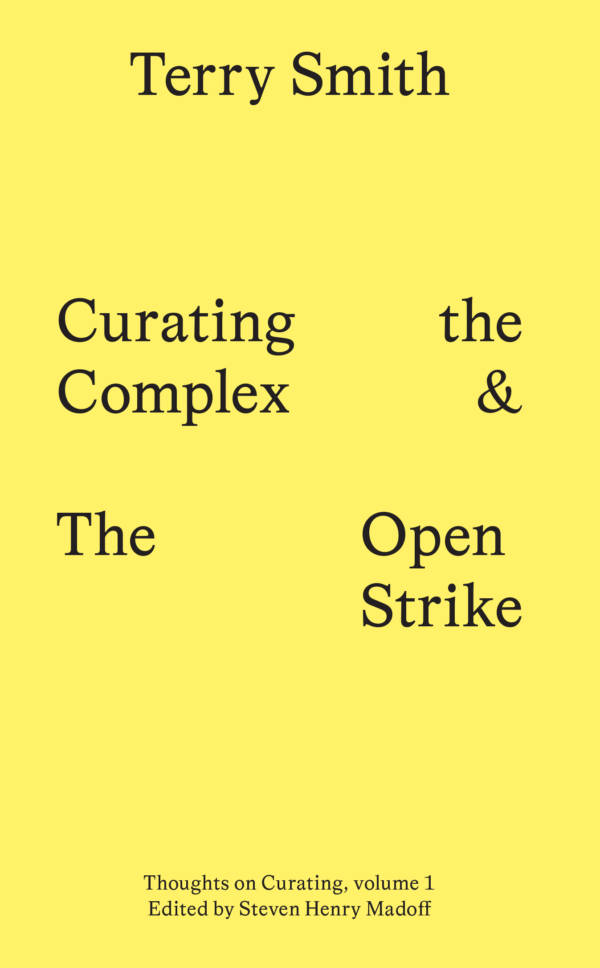
Curating the Complex & The Open Strike
A visionary analysis of what Terry Smith identifies as the "visual arts exhibitionary complex."
In this book, the renowned art historian and writer maps the institutional and quasi-institutional framework for contemporary art that sprawls across the globe. He then delves into a powerful form of curatorial activism rising up in the exhibitionary complex: Open Strike. This is the inaugural volume of the series Thoughts on Curating, edited by Steven Henry Madoff.
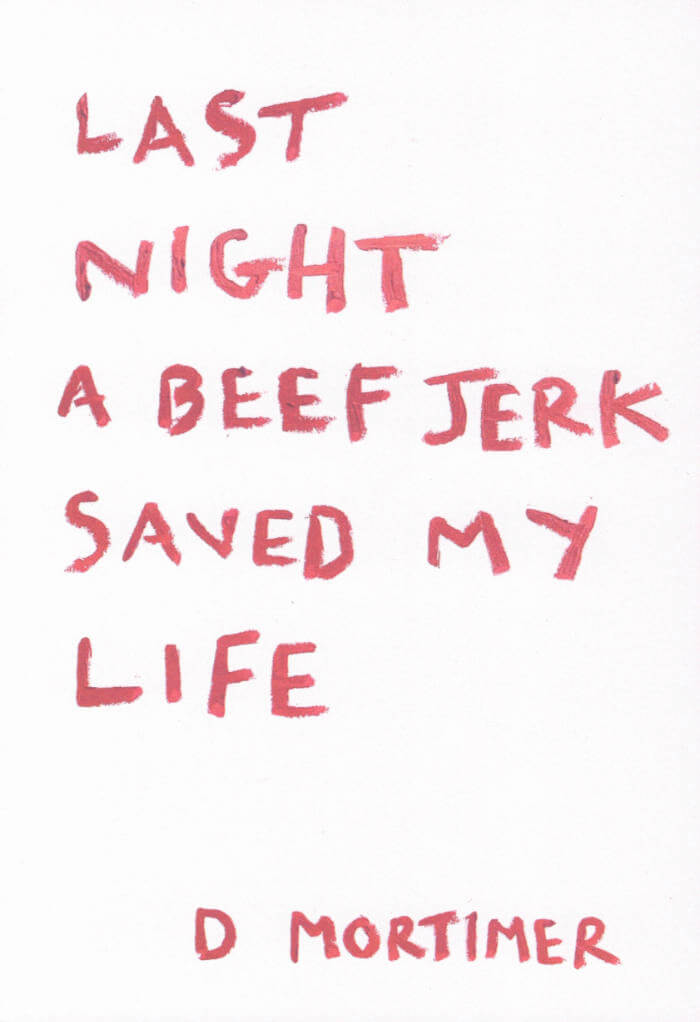
Last Night A Beef Jerk Saved My Life
'Mortimer is one of the most talented writers of our generation and their debut collection proves this. Part essay, part poem, part memoir and part SOS, Last Night a Beef Jerk Saved My Life navigates its thematic scope—ranging from transness, queerness and naming to loving and losing—with sensitivity, insight, humour and bravado. Best thing I read this year.' - Isabel Waidner
'Last Night a Beef Jerk Saved My Life is a wonderful and thoughtful reflection on love and beauty and bodies and music and memories, and on the constellations of small things that make up modern queer life.' - Huw Lemmey
D Mortimer is a writer from London focussed on trans crip narratives. Their work (essays, poetry, prose, creative-criticism) has appeared in Granta and been performed at the Institute of Contemporary Art in London (Queers Read This, The Kathy Acker Reading Group). Their short story ‘Supermarket Revelations’ was published in Liberating the Canon: An Anthology of Innovative Fiction (ed. Waidner, Dostoyevsky Wannabe: 2018) and a poem-essay, 'How To Draw Hands', was published by Warm Yourself by My Trash Fire in 2020.

Art Monsters: Unruly Bodies in Feminist Art
A dazzlingly original reassessment of women's stories, bodies and art - and how we think about them.
For decades, feminist artists have confronted the problem of how to tell the truth about their experiences as bodies. Queer bodies, sick bodies, racialised bodies, female bodies, what is their language, what are the materials we need to transcribe it?
Exploring the ways in which feminist artists have taken up this challenge, Art Monsters is a landmark intervention in how we think about art and the body, calling attention to a radical heritage of feminist work that not only reacts against patriarchy but redefines its own aesthetic aims.
Writing in the tradition of Susan Sontag, Hélène Cixous and Maggie Nelson, Lauren Elkin demonstrates her power as a cultural critic, weaving daring links between disparate artists and writers - from Julia Margaret Cameron's photography to Kara Walker's silhouettes, Vanessa Bell's portraits to Eva Hesse's rope sculptures, Carolee Schneemann's body art to Theresa Hak Kyung Cha's trilingual masterpiece DICTEE - and shows that their work offers a potent celebration of beauty and excess, sentiment and touch, the personal and the political.
'Destined to become a new classic' - Chris Kraus

Truth & Dare
The debut fiction collection from an inimitable critic, Truth & Dare is a deeply personal and fantastical ride through gender, trauma, queerness, science, history, and religion.
Cornish mermaids take to the football pitch to protest warming seas. Trans students in Manchester searching for the perfect dick accidentally warp the fabric of spacetime. England's worst pogrom comes for York's particle collider, powered by bread and gender energy. On Bournemouth beach, a storm delivers an ancestor across oceans of time to sire a drowning descendant. The devil stands a drink at London's famous gay pub, The Black Cap, while Artemis, in the guise of Joan of Arc, roams a life-or-death night in East Sussex.
Remember the Witchcraft Act of 1927, and the refugees that fled via cinema to defend the Republic of Catalunya? Of course not, it's been written out of history. This is England, (but not?) as we know it.
A queer quantum tour through what was, what is, what could have been and may yet still come to pass, in a collection that braids high-wire believe-it-or-not memoir with cutting-edge science fiction (or is it?) from alternate timelines that vibrate very close to ours. Truth or dare? Both, always.
So Mayer is a writer, indie bookseller, film curator, and pencil stan. Their most recent books are A Nazi Word for a Nazi Thing (Peninsula, 2020), a short essay on queer art, censorship and resistance, and <jacked a kaddish> (Litmus, 2018), a poetry sequence about interwar masculinity, technology and hats, and their BFI Film Classics on Orlando is forthcoming. Their work across genres and forms has been published internationally, including in Roxane Gay's anthology Not that Bad: Dispatches from Rape Culture, in several Criterion DVDs, and in Ignota Press's Spells: 21st Century Occult Poetry. Plus their poetry once appeared on hoardings in Dublin. With Adam Zmith, they collaborated on Unreal Sex for Cipher, an anthology of queer SFFH, and on the BBC Sounds podcast The Film We Can't See, a tour through queer film history.

Worms #7 'Artists who Write and Writers who Art'
The ‘Artists who Write and Writers who Art’ Issue. For Worms 7 we’ve looked to our visual counterparts for some soil nutrients. We’ve wormed our way into the psyche of the artist, to bring you the ‘Artists That Write, and Writers That Art’ issue. Many of our subjects in the past have come into writing via non-traditional routes (filmmaking, curation, art, performance, podcasting, and so on), so it only felt right to cast a spotlight over those who have inspired our experimental literary practices so far. Not only those that use words within their visual practice, but those who use images to inform their writing. The reader, the writer, the artist, the activist, the poet and performer; they’re all here and they’re all worms.
In this mega worm (which is fittingly pink, for the first time somehow) you are in for a feast. Clem interview Helen Marten, Martine Syms and Diamond Stingily, Caitlin interviews actual art-writing icon Olivia Laing, Pierce talks to the profound Dr. Joy James, Philippa Snow gives us her thoughts on the act of writing art criticism (spoiler: it’s out her ass), and we have enough Derek Jarman content to keep you going for the rest of the year. We have some hilarious/insightful/weird/wonderful contributions from some of your favourite regulars too; including Jess Cole, Isabelle Bucklow, Sam Moore, Haydée Touitou, Estelle Hoy and many others.
(Note from the publisher)
FEATURING:
DIAMOND STINGILY, HELEN MARTEN, NICOLE RUDICK, NIKI DE SAINT PHALLE, MARTINE SYMS, OLIVIA LAING, DR. JOY JAMES, JORDAN WEITZMAN, WU TSANG, DEREK JARMAN, SABINE MIRLESSE, MISHA HONCHARENKO, CHANTAL AKERMAN, JOANNA NOVAK, ANNIE ERNAUX, DAISY SANCHEZ, JENNA SUTELA, ANICKA YI, TUOMAS A. LAITINEN, STEPHANIE COMILANG & SIMON SPEISER, VALERIE SOLANAS
CONTRIBUTORS:
HAYDEÉ TOUITOU, L SCULLY & LUCAS RESTIVO, LEE RAE WALSH, JESS COLE, ESTELLE HOY, PHILIPPA SNOW, SAMANTHA ROSENWALD, ISABELLE BUCKLOW, MONA GLASSFIELD, CLEM MACLEOD, SARAH WHITE, CAITLIN MCLOUGHLIN, PAVIELLE GARCIA, IONE SAIZAR, CHANTAL JOFFE, SOPHIE DAVIDSON, PIERCE ELDRIDGE, VIOLET CONROY, ELLE PÉREZ, PAUL MPAGI SEPUYA, JACQUELINE ENNIS-COLE, MARY ADETURINMO, STEPH FRANCIS-SHANAHAN, SAM MOORE, BUG SHEPHERD-BARRON, DONNA MARCUS DUKE, SAM HOLTON BRADLEY, KITTY GRADY, FELIX PILGRIM, CICI PENG, HOLLY MILLS, THEA MCLACHLAN, ERICA GOULD, PAULA DUCAY AND INÉS GARCÍA, ELVIRA GARCIA, INÊS GERALDES CARDOSO, JODIE HILL, JEMIMA SKALA, MAURA SAPPILO, DELIA RAINEY

ROT ISSUE ONE 2023: IMMUNITY
ROT is the catalogue for a community of practices.
ROT is a medicine and a ritual. The prescription for a new therapy.
ROT is a manual without instructions. A map. A party.
ROT touches upon sci-fi doomed scenarios.
ROT works within the ruins of the future.
ROT engages in weird beautification processes.
ROT uses mushrooming as a research method.
ROT hosts essays, stories, poetry, interviews, visuals, recipes, horoscopes and more.
ROT is mouldy.
ROT is glossy and asks to be touched.
With contributions by Adrijana Gvozdenović, Agnese Krivade, Alix Eynaudi, Anne Juren, Asli Hatipoglu, Carolina Mendonça, Cécile Tonizzo, Coline Gautier, Daniele Gasparinetti, Deborah Robbiano, Eleanor Ivory Weber, Elke Van Campenhout, Ēriks Ašmanis, Eve Gabriel Chabanon, Gary Farrelly, Goda Palekaitė, Günbike Erdemir, Jaime Llopis, Jennifer Russo, Jeroen Peeters, Jonas Palekas, Kristin Wiking, Lucia Palladino, Luciano Maggiore, Marko Gutić Mižimakov, Michelle Anay Woods, Muna Mussie, Muslin Brothers, Natasha Papadopoulou, Nina Janela, Norberto Llopis, Paloma Bouhana, Peggy Pierrot, Sandra Muteteri Heremans, Santiago Ribelles Zorita, Sara Manente, Sébastien Tripod, Sina Seifee, Sofie Durnez, Wilson Le Personnic
Sara Manente is a multidisciplinary artist and researcher who promotes collaborative situations in heterogeneous formats. Drawing on the imagery and matter of living cultures and mycelium brought into relation with live arts, her recent projects reflect on the possibility of contamination between pedagogy, research, performance and publication.
Published by Varamo Press
First edition, August 2023
136 pages, 22 x 30 cm, perfect binding
ISBN 978-82-693189-2-0
Graphic design by Deborah Robbiano

Corey Fah Does Social Mobility
The radical, joyful follow-up to the Goldsmiths Prize-winning Sterling Karat Gold.
This is the story of Corey Fah, a writer on the cusp of a windfall, courtesy of the Social Evils prize committee, for whom the actual gong - and with it the prize money - remains tantalizingly out of reach.
Neon beige, with UFO-like qualities, the elusive trophy leads Corey, with partner Drew and surprise eight-legged companion Bambi Pavok, on a spectacular detour through their childhood in the Forest - via an unlikely stint on reality TV. Navigating those twin horrors, through wormholes and time loops, Corey learns - the hard way - the difference between a prize and a gift.
Both radiant and revolutionary, Isabel Waidner's fiction gleefully takes a hammer to false binaries, boundaries and borders, turning walls into bridges and words into wings. Fierce, fluid and funny, they free us to imagine another way of being.
This is a novel about coming into one's own, the labour of love, the tendency of history to repeat itself and the pitfalls of social mobility. It's about watching TV with your lover.
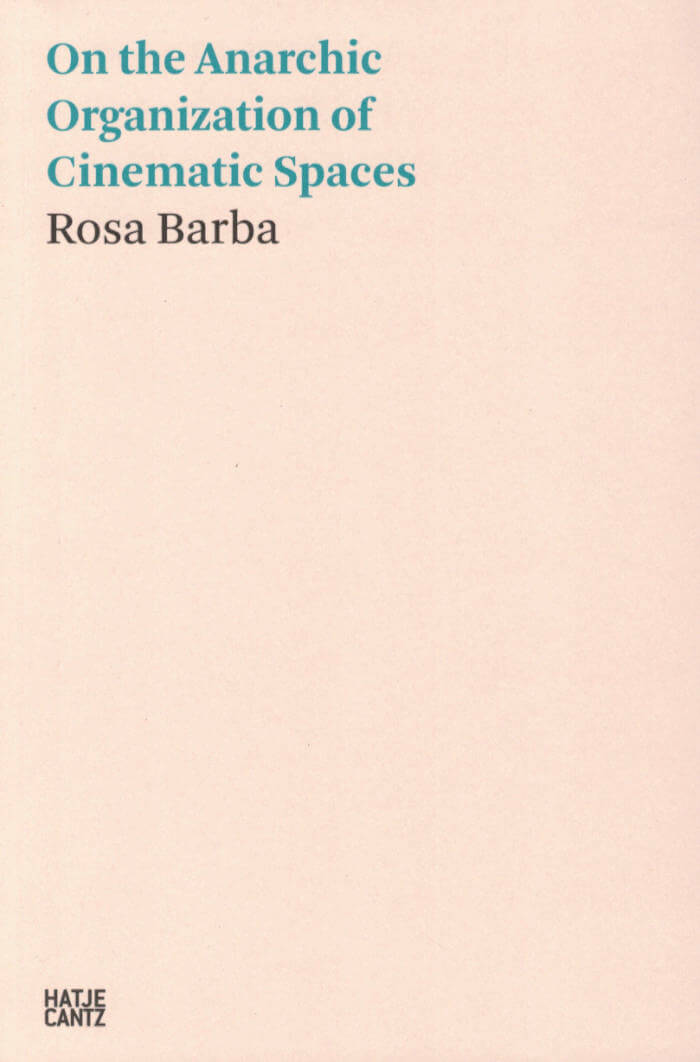
On the Anarchic Organization of Cinematic Spaces – Evoking Spaces beyond Cinema
Employing the concept of an anarchic organization of cinematic spaces, the author embarks in this volume on a journey toward an imaginary political trope for the cinema of the present – a working principle that aims to form a new way of thinking by destabilizing outdated structures of cinema.
ROSA BARBA (*1972, Agrigento, Italy) is an acclaimed artist who works with film. She is the recipient of numerous awards, including the renowned Calder Prize. Her work has been exhibited at the Museo Nacional Centro de Arte Reina Sofía, Madrid, the Schirn Kunsthalle, Frankfurt, and the MIT List Visual Arts Center, Cambridge, MA, among others.

A Very Easy Death
Long considered one of Simone de Beauvoir’s masterpieces, A Very Easy Death is a profoundly affecting, day-by-day recounting of her mother’s final days after she is hospitalized following a fall. Though a devout Catholic, her faith is subsumed by her terror of death, and as her body fails, she clings to life with fierce, primal desperation.
In depicting her mother’s refusal to ‘go gentle’ while her autonomy and dignity are taken from her, Simone de Beauvoir ‘shows the power of compassion when it is allied with acute intelligence’ (Sunday Telegraph). Powerful, touching and sometimes shocking, this is an end-of-life account that no reader is likely to forget.

The Complete Fear of Kathy Acker
Published in excerpts over almost four decades, Jack Skelley’s “secretly legendary” novel is at once an homage to the thrillingly inventive spirit of Kathy Acker’s cut-up novels and a definitive history of LA’s underground culture of the mid-1980s.
Composed in bursts, Fear of Kathy Acker depicts Los Angeles through the eyes of a self-mocking narrator. Shifting styles and personae as he moves between Venice and Torrance, punk clubs and shopping malls, Disneyland and Dodger Stadium, Jack Skelley pushes the limits of language and identity while pursuing–like Kathy Acker–a quixotic literary mix of discipline and anarchy. In this adrenalized, cosmic and comic chronicle of Los Angeles, Skelley's “real life” friends make cameo appearances alongside pop archetypes from Madonna to Billy Idol.
This first-ever complete edition of the book includes new essays, playlists, and a map of the 1980s Los Angeles in which its manic protagonist lives and loves.
Afterword by Sabrina Tarasoff.
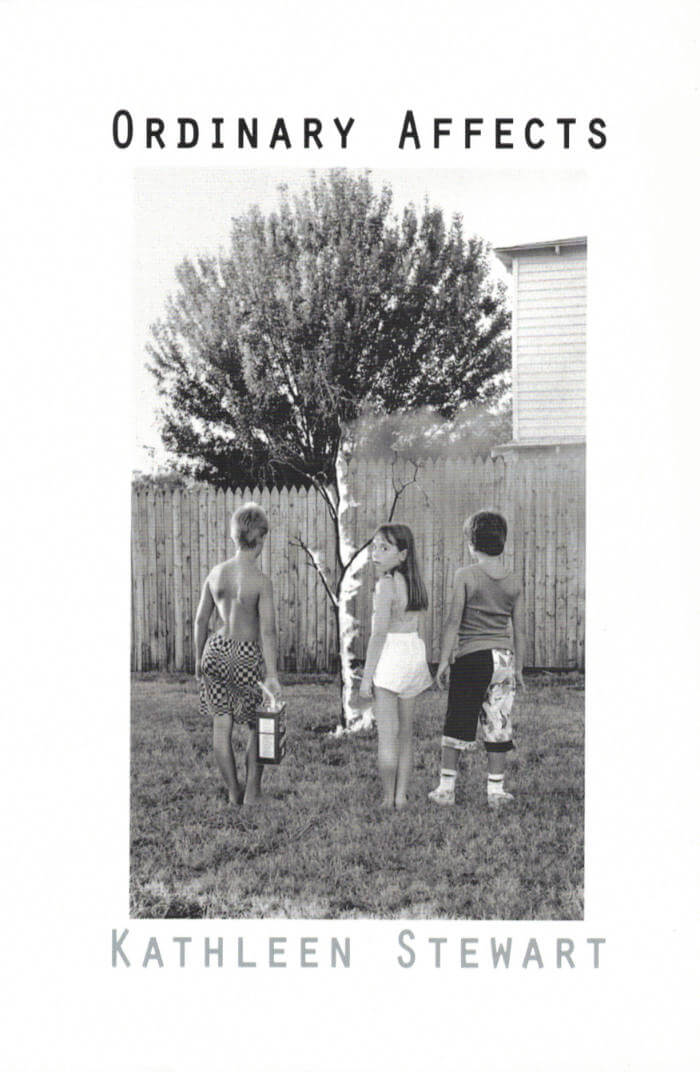
Ordinary Affects
Ordinary Affects is a singular argument for attention to the affective dimensions of everyday life and the potential that animates the ordinary. Known for her focus on the poetics and politics of language and landscape, the anthropologist Kathleen Stewart ponders how ordinary impacts create the subject as a capacity to affect and be affected. In a series of brief vignettes combining storytelling, close ethnographic detail, and critical analysis, Stewart relates the intensities and banalities of common experiences and strange encounters, half-spied scenes and the lingering resonance of passing events.
While most of the instances rendered are from Stewart’s own life, she writes in the third person in order to reflect on how intimate experiences of emotion, the body, other people, and time inextricably link us to the outside world.Stewart refrains from positing an overarching system—whether it’s called globalization or neoliberalism or capitalism—to describe the ways that economic, political, and social forces shape individual lives. Instead, she begins with the disparate, fragmented, and seemingly inconsequential experiences of everyday life to bring attention to the ordinary as an integral site of cultural politics. Ordinary affect, she insists, is registered in its particularities, yet it connects people and creates common experiences that shape public feeling.
Through this anecdotal history—one that poetically ponders the extremes of the ordinary and portrays the dense network of social and personal connections that constitute a life—Stewart asserts the necessity of attending to the fleeting and changeable aspects of existence in order to recognize the complex personal and social dynamics of the political world.

Ghostly Matters: Haunting and the Sociological Imagination
Drawing on a range of sources, including the fiction of Toni Morrison and Luisa Valenzuela (He Who Searches), Avery Gordon demonstrates that past or haunting social forces control present life in different and more complicated ways than most social analysts presume. Written with a power to match its subject, Ghostly Matters has advanced the way we look at the complex intersections of race, gender, and class as they traverse our lives in sharp relief and shadowy manifestations.
“Ghostly Matters immediately establishes Avery Gordon as a leader among her generation of social and cultural theorists in all fields. The sheer beauty of her language enhances an intellectual brilliance so daunting that some readers will mark the day they first read this book. One must go back many more years than most of us can remember to find a more important book.” —Charles Lemert

What Should We Do with Our Brain?
Recent neuroscience, in replacing the old model of the brain as a single centralized source of control, has emphasized “plasticity,” the quality by which our brains develop and change throughout the course of our lives. Our brains exist as historical products, developing in interaction with themselves and with their surroundings.
Hence there is a thin line between the organization of the nervous system and the political and social organization that both conditions and is conditioned by human experience. Looking carefully at contemporary neuroscience, it is hard not to notice that the new way of talking about the brain mirrors the management discourse of the neo-liberal capitalist world in which we now live, with its talk of decentralization, networks, and flexibility. Consciously or unconsciously, science cannot but echo the world in which it takes place.
In the neo-liberal world, “plasticity” can be equated with “flexibility”—a term that has become a buzzword in economics and management theory. The plastic brain would thus represent just another style of power, which, although less centralized, is still a means of control.
In this book, Catherine Malabou develops a second, more radical meaning for plasticity. Not only does plasticity allow our brains to adapt to existing circumstances, it opens a margin of freedom to intervene, to change those very circumstances. Such an understanding opens up a newly transformative aspect of the neurosciences.
In insisting on this proximity between the neurosciences and the social sciences, Malabou applies to the brain Marx’s well-known phrase about history: people make their own brains, but they do not know it. This book is a summons to such knowledge.

The Ends of Performance
A broad and inclusive volume of the celebrations and critiques of performance arts.
Focusing on the living arts—dance, theatre, music, performance art, ritual, and popular entertainment—performance studies expands our understanding of "performance" as both a vital artistic practice and a means by which to understand social and cultural processes. Bridging the gap between cultural studies, performing arts, and anthropology, performance studies explores myriad ways in which performance creates meaning and shapes our everyday lives.
The broadest and most inclusive volume to date, The Ends of Performance both celebrates and critiques the institutionalization of the field. Only recently has the field given keen attention to the interpretive force and consequences of performance events, and it is these consequences that the The Ends of Performance articulates. Here performance studies illuminates the complex social and cultural formations of our time—the impact of virtual technology, the racialized discourses of legal and cultural citizenship, the impact of new medical discourses, and the medicalization of the body. Featuring work by leading theorists such as Joseph Roach, Diana Taylor, and Richard Schechner, excursions into performative writing by Eve Kosofsky Sedgwick and Della Pollock, and texts by performance artists Orlan and Deb Margolin, The Ends of Performance illuminates the provocative intellectual ends which motivate these varied approaches to performing writing, and to writing performance.

Meeting the Universe Halfway
Meeting the Universe Halfway is an ambitious book with far-reaching implications for numerous fields in the natural sciences, social sciences, and humanities. In this volume, Karen Barad, theoretical physicist and feminist theorist, elaborates her theory of agential realism. Offering an account of the world as a whole rather than as composed of separate natural and social realms, agential realism is at once a new epistemology, ontology, and ethics. The starting point for Barad’s analysis is the philosophical framework of quantum physicist Niels Bohr. Barad extends and partially revises Bohr’s philosophical views in light of current scholarship in physics, science studies, and the philosophy of science as well as feminist, poststructuralist, and other critical social theories. In the process, she significantly reworks understandings of space, time, matter, causality, agency, subjectivity, and objectivity.
In an agential realist account, the world is made of entanglements of “social” and “natural” agencies, where the distinction between the two emerges out of specific intra-actions. Intra-activity is an inexhaustible dynamism that configures and reconfigures relations of space-time-matter. In explaining intra-activity, Barad reveals questions about how nature and culture interact and change over time to be fundamentally misguided. And she reframes understanding of the nature of scientific and political practices and their “interrelationship.” Thus she pays particular attention to the responsible practice of science, and she emphasizes changes in the understanding of political practices, critically reworking Judith Butler’s influential theory of performativity. Finally, Barad uses agential realism to produce a new interpretation of quantum physics, demonstrating that agential realism is more than a means of reflecting on science; it can be used to actually do science.

Let’s Become Fungal! Mycelium Teachings and the Arts
There is a growing interest in fungi and mycelium as a material, the ever-branching connecting threads of the fungal world. The entanglements and how this rhizomatic network functions is not just a fascinating ecological system and material, but carries a profound usefulness as a metaphor for our potential new systems, ways of thinking and behaviors.
Let’s Become Fungal! takes its inspiration from the world of art and mycology and shares innovative practices from Latin America and the Caribbean that are rooted in multispecies collaboration, symbiosis, alliances, non-monetary resource exchange, decentralization, bottom-up methods and mutual dependency—all in line with the behavior of the mycelium.
Every chapter is phrased as a question. They do not lead to answers, but to twelve teachings addressing for instance collaboration, decoloniality, non-linearity, toxicity, mobilization, biomimicry, death, and being non-binary. Simultaneously it ventures deeper into the world of fungi. The teachings from the fungus may inspire artists, collectives, organizations, educators, policy-makers, designers, scientists, anthropologists, change-makers, curators, urbanists, activists, gardeners, community-leaders, farmers, and many others, to become more fungal in their ways of working and being.
Inspired by conversations with: Francisca Álvarez Sánchez, Carolina Caycedo, Annalee Davis, Maya Errázuriz, Juan Ferrer, Lilian Fraiji, Giuliana Furci, Sofía Gallisá Muriente, Yina Jiménez Suriel, Patricia Kaishian, Mirla Klijn and Olaf Boswijk, Lola Malavasi and Daniela Morales Lisac, Martina Manterola and Carmen Serra, Camila Marambio, Mariana Martínez Balvanera, Claudia Martínez Garay, Lina Meija and Luciana Fleischman, Tomaz Morgado Françozo and Marília Carneiro Brandão, Marion Neumann, Maria Alice Neves, Tara Rodríguez Besosa, Raquel Rosenberg, Juli Simon, Ela Spalding, Gianine Tabja, Gabriela Flores del Pozo and Lucia Monge, Fer Walüng, Tatyana Zambrano.

Productive Archiving
Productive Archiving discusses a variety of problems of archival organizations. It mainly focuses on the following three issues that are usually overlooked: first, the question of inclusion in or exclusion from the archive; second, the loss of individuality in the archive, the danger of homogenization; and third, that archiving may become a form of pigeonholing, boxing specific identities into a confined space.
Avoiding the archive because of these problems is not an option, because archival organization is a basic symbolic mode on the basis of which we organize our lives, the past, the present and the future. What this book suggests is that it is best to explore constructive and creative solutions for these problems. Especially artistic archives seem to be able to develop these possible solutions, because they offer speculative, unexpected ways to order, select, and narrate specific information, and bring about new connections and archival organizations.
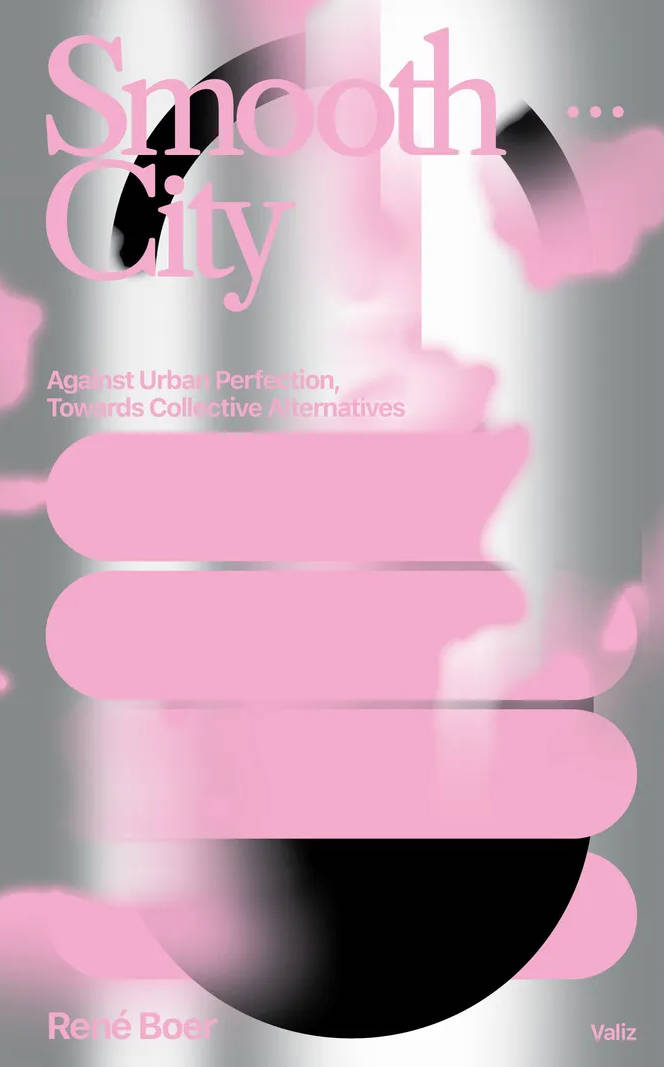
Smooth City
In the foreword of Smooth City, René Boer writes about changes shaping the city center of Amsterdam nowadays: how the streets once known for their roughness, are now characterized by homogenous aesthetics, minimalist shopping windows and shiny Uber taxis. These are typical characteristics of the ‘smooth city’: a city in which the urge for ‘perfection’, efficiency and control is constantly increasing. It is a kind of city which is sterile, clean and layered with new technologies, which makes urban life seemingly ‘perfect’ and frictionless. It can be questioned, however, whether there is still place for divergence from norms, forms of friction or any alternative in the smooth city?
René Boer argues in Smooth City that this new version of urbanity undermines the democratic nature and the emancipatory potential of cities, and hardly leaves any space for experiment, non-normativity and transgression. Although the book states that the desire for a safe, clean and well-functioning urban environment is understandable, it also provides a framework to challenge this obsession with perfection and to instead collectively work towards porosity in the urban realm. Smooth City offers a critical analysis of the origins, characteristics and consequences of the smooth city and brings some very welcome reflections on the urban reality we are currently living in. The book also contains a series of ‘smoothscapes’, collages made by visual artist and graphic designer Kees de Klein, reflecting on this smooth urban reality.

Sensing Earth: Cultural Quests Across a Heated Globe
Philipp Dietachmair, Pascal Gielen and 1 more
Sensing Earth states that our environmental issues are in the first place a matter of culture and aesthetics. Technology and science are not enough to solve these problems.
Our globe is facing an escalation of ecological problems, with no quick solutions in sight. We seem to be caught in a spiral of health issues, burnout, sensory overload, depression, and somatic deprivation. Artists faced with these crises are looking for ways to articulate the ongoing emergencies and explore possible ways out. However, the arts and culture are caught in a double bind. Artists and cultural initiatives need circulation to let ideas intersect and create meaningful connections. However, this globalized system also contributes to the planet’s ecological decline: by countless journeys from one biennale, international residency, touring exhibition and networking event to the next. After the Covid-19 pandemic ‘business as usual’ seems to prevail.
Sensing Earth includes essays, interviews, poetry, manifestos, choreographic prompts, speculative fiction, and case studies operating at the intersection of art and activism, culture and nature. All texts explore what sensorial foundations are necessary to address systemic failures, and what routes to take for keeping us moving on this planet, physically, emotionally and intellectually.
Contributors: Grégory Castéra, Center for Arts, Design and Social Research (Dalída Maria Benfield, Christopher Bratton, Luigi Coppola, Pelin Tan), Philipp Dietachmair, Futurefarmers, Pascal Gielen, Marina Guzzo, INLAND (Fernando García-Dory), Meander, Georgia Nicolau, Luciane Ramos Silva, Noel B. Salazar, Joy Mariama Smith, Naine Terena de Jesus, Dea Vidović, André Wilkens, Ana Žuvela

Is Now the Time for Joyous Rage? – (A Series of Open Questions, vol. 4)
Jacqueline Francis, Jeanne Gerrity
The fourth book in the annual series A Series of Open Questions published by CCA Wattis Institute for Contemporary Arts and Sternberg Press is informed by themes found in the work of Lorraine O'Grady, including diaspora, Black female subjectivity, racial hybridity, translation, intersectional feminism, institutional critique, Black representation in the art world, archives, music, Conceptualism, and performance art.
The Wattis Institute's annual reader, A Series of Open Questions, provides an edited selection of perspectives, images, and references related to the Wattis's year-long "On our mind" research seasons. Each volume includes newly commissioned writing by members of the research season's core reading group, as well as text and visual contributions by a diverse range of other artists and writers. The title of each reader takes the form of a question and becomes, as new books are published, a gradually evolving series of open questions.
Contributions by The Allman Brothers Band, Charles Baudelaire, Selam Bekele, Martin Bernal, Linda Goode Bryant and Rujeko Hockley, Camille Chedda, Gabrielle Civil, Kathleen Collins, Erica Deeman, Jeanne Finley & John Muse, Jacqueline Francis, Edouard Glissant, E. Jane, Bec Imrich, Charles Lee, Darrell M. McNeil, Denise Murrell, Sawako Nakayasu, Lorraine O'Grady, Yétúndé Olagbaju, Hsu Peng & Allison Yasukawa, Lara Putnam, Trina Michelle Robinson, Legacy Russell, David Scott, Peter Simensky, Carrie Mae Weems, Judith Wilson, Alisha Wormsley.

Sibyl's Mouths
Mark Von Schlegell, Luzie Meyer and 3 more
Sibyl's Mouths is the most recent in a series of publications by Pure Fiction, a writing and performance group with shifting members active since 2011.
From February 12 to March 6, 2022, Pure Fiction presented an exhibition and performance program at the Kölnischer Kunstverein in Cologne titled "Shifting Theater: Sibyl's Mouths". The starting point was a collective reading of Mary Shelley's 1826 novel The Last Man, in which the narrator discovers a collection of scribbled oak leaves scattered in a cave outside Naples. Alleged prophecies of the Cumean Sibyl, the textual fragments inscribed on the leaves foretell the story of an epidemic that ravages the globe in the 2100's—a period where solitude, intimacy, and the perception of time is radically renegotiated.
Through a multiplicity of textual genres and writerly approaches, contributors examine the questions and forms that emerge from prophecy: the role of the voice in text, writing and performance; fragmentary heterogeneous narratives.
The mouth is consulted, not only as a mouthpiece or as a cavernous instrument for vocalization but as an essential part of the digestive tract. Processes in the gut, such as assimilation, excretion, and regurgitation involve multiple temporal directionalities, and may function as metaphorical gateways to intuitive truths.
Contributions by Rosa Aiello, Gerry Bibby, Coleman Collins, Ayanna Dozier, Annie Ernaux, Amelia Groom, Michèle Graf & Selina Grüter, Monilola Olayemi Ilupeju, Ellen Yeon Kim, Bitsy Knox, Dan Kwon, Erika Landström, Enad Marouf, Katrin Mayer, Aislinn McNamara, Kamila & Jasmina Metwaly, Luzie Meyer, Vera Palme, Theresa Patzschke, Georgia Sagri, Mahsa Saloor, Elif Saydam, Mark von Schlegell, Simon Speiser, Elaine Tam, C.S. Tolan, Mikhail Wassmer, Anna Zacharoff.
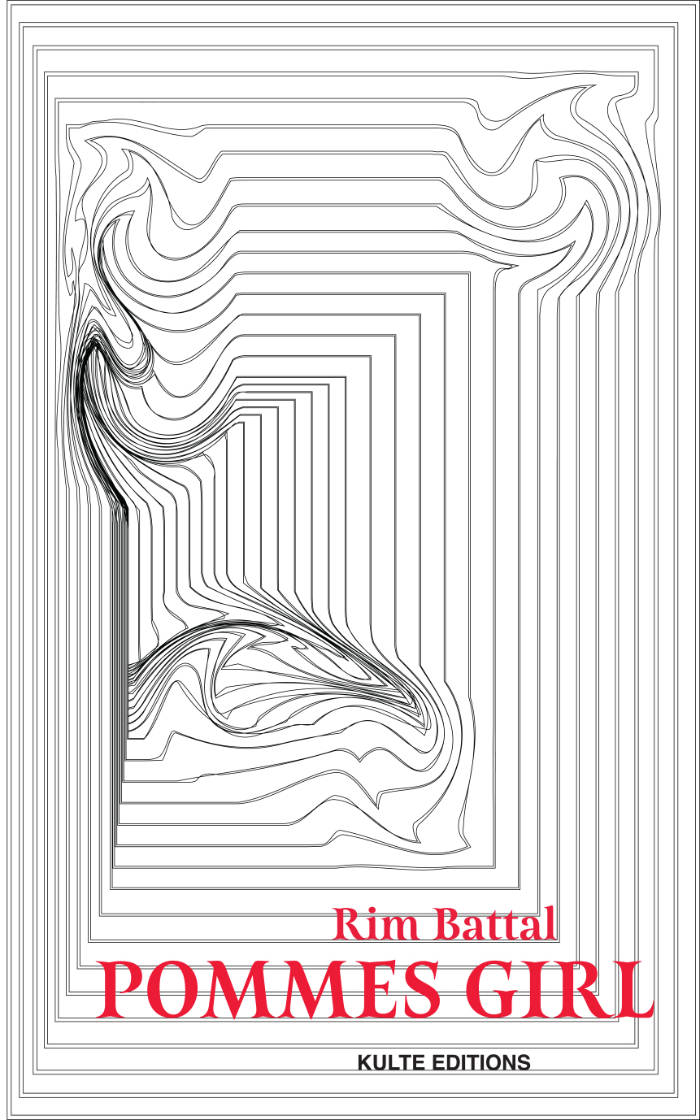
Pommes Girl / أحتفل بالحياة التي تحتفل بي
The story of a meeting between a woman and a man linked by music for one night, in a nuptial dance of bodies and words doomed to failure: an ode to desire by the Franco-Moroccan poetess.
Rim Battal (born 1987 in Casablanca, lives and works between Paris and Rabat since 2012) is a French artist and poet.
Edited by Yasmina Naji.
Translated into Arabic by Abdelilah Khattabi.

Fair Game Leipzig
“This publication was planned before it was decided to coincide it with the exhibition Fair Game Leipzig at the Museum of Contemporary Art Leipzig. It is composed of drawings that I made in 2013. The cover instead was designed in 2019 in relation to the exhibition in Leipzig. I wanted it to be in contrast with the gentle drawings inside.” — Nathalie Du Pasquier
A famous designer and co-founder of the Memphis group in Milan in 1981, Nathalie Du Pasquier (born 1957 in Bordeaux, France, lives in Milan, Italy) accompanied the (post)modern adventure around designer Ettore Sottsass, with the creation of objects, fabrics, carpets, and furniture. In 1986, she started devoting herself exclusively to two- and three-dimensional painting. Memphis's radicalism and formal inventiveness measured solely in terms of a scathing and iconoclastic postmodernism erased a little too quickly the adventure's modern foundations. Nathalie Du Pasquier's paintings are a perfect revelation of these connections: axonometric compositions applied to painting, the palette of muffled colors, objects, when they are present in the compositions, wink at the purism of a Corbusier or an Ozenfant. Mixed with memories and assimilations arising from the most tridimensional Suprematism–the architectones–some paintings and constructions also give prominence to this history of art and the applied arts.